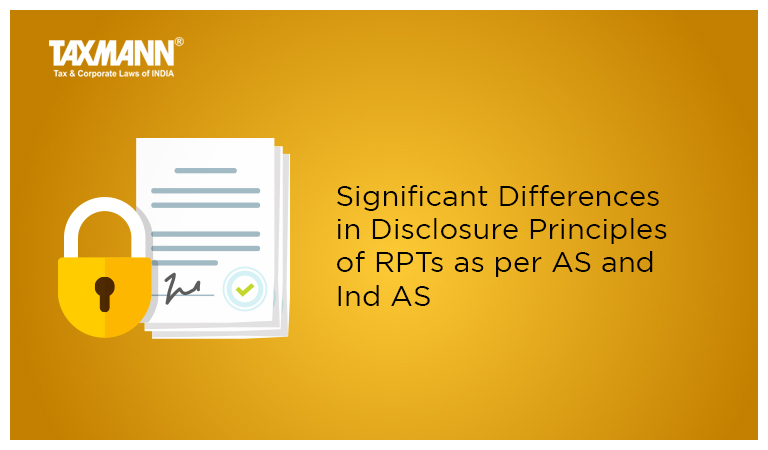Significant Differences in Disclosure Principles of RPTs as per AS and Ind AS
- News|Blog|Account & Audit|
- 2 Min Read
- By Taxmann
- |
- Last Updated on 23 August, 2022

AS 18, Related Party Disclosures deals with the disclosures of related party relationships; and transactions between a reporting enterprise and its related parties, whereas Ind AS 24, Related Party Disclosures require disclosure of related party relationships, transactions, and outstanding balances, including commitments, in the consolidated and separate financial statements of a parent or investors with joint control of, or significant influence over, an investee presented in accordance with Ind AS 110, Consolidated Financial Statements, or Ind AS 27, Separate Financial Statements.
The core of disclosure principles under both Standards are similar, but there are a few disclosure differences between the provisions of AS 18 and Ind AS 24 that are explained below:
Disclosure requirement as per Indian Accounting Standard (Ind AS-24):
1. Relationships between a parent and its subsidiaries shall be disclosed irrespective of whether there have been transactions between them.
An entity shall disclose the name of its parent and, if different, the ultimate controlling party. If neither the entity’s parent nor the ultimate controlling party produces consolidated financial statements available for public use, the name of the next most senior parent that does so shall also be disclosed.
2. An entity shall disclose key management personnel (KMP) compensation in total and for each of the following categories:
(a) short-term employee benefits;
(b) post-employment benefits;
(c) other long-term benefits;
(d) termination benefits; and
(e) share-based payment.
Amounts incurred by the entity for the provision of key management personnel services that are provided by a separate management entity shall be disclosed.
Disclosure requirement as per Accounting Standard (AS- 18):
1. Where one entity controls or is controlled by a second entity or any person, then the name of the second entity or person and the nature of the related party relationship must be disclosed even if there is no transaction between both parties during the year. However, there is no requirement to disclose the name of the next most senior parent who produces consolidated financial statements for public use.
2. AS 18 does not specifically requires the disclosures for compensation of KMP under different categories.
Click Here To Read The Full Story
Disclaimer: The content/information published on the website is only for general information of the user and shall not be construed as legal advice. While the Taxmann has exercised reasonable efforts to ensure the veracity of information/content published, Taxmann shall be under no liability in any manner whatsoever for incorrect information, if any.

Taxmann Publications has a dedicated in-house Research & Editorial Team. This team consists of a team of Chartered Accountants, Company Secretaries, and Lawyers. This team works under the guidance and supervision of editor-in-chief Mr Rakesh Bhargava.
The Research and Editorial Team is responsible for developing reliable and accurate content for the readers. The team follows the six-sigma approach to achieve the benchmark of zero error in its publications and research platforms. The team ensures that the following publication guidelines are thoroughly followed while developing the content:
- The statutory material is obtained only from the authorized and reliable sources
- All the latest developments in the judicial and legislative fields are covered
- Prepare the analytical write-ups on current, controversial, and important issues to help the readers to understand the concept and its implications
- Every content published by Taxmann is complete, accurate and lucid
- All evidence-based statements are supported with proper reference to Section, Circular No., Notification No. or citations
- The golden rules of grammar, style and consistency are thoroughly followed
- Font and size that’s easy to read and remain consistent across all imprint and digital publications are applied



 CA | CS | CMA
CA | CS | CMA
